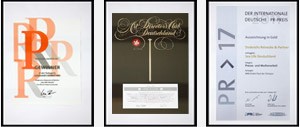Contact
DEDERICHS REINECKE & PARTNER
Public Relations Consultants
Schulterblatt 58
20357 Hamburg
Fon: +49 40 20 91 98 220
E-Mail: info@dr-p.de
PR-Agentur Hamburg
Imprint | Privacy policy
Awards

Let’s talk about exclusivity. No, we’re not talking about designer handbags, we’re talking about what’s preferred in our industry: Information.
We discuss this topic regularly. More specifically, whether important information should be given exclusively to selected media or evenly distributed to the “big list” is also a question of strategy and attitude.
Let’s take a look at what our colleague Svantje Bergemann has to say about this:
“For me, exclusivity in media relations is a special form of appreciation. When I offer a journalist an exclusive topic, I am ultimately pursuing two goals: First, I support their work by providing them with a relevant story, and second, I strengthen the relationship between the medium and the company I advise. In my experience, journalists value exclusives, and I value providing the right information to the right media to create relevance for the readership. What could be wrong with that?”
After Svantje Bergemann describes the advantages of exclusive media cooperation, our colleague Luise Klingenberg adds a few counterpoints. After all, exclusive media deals are not without their ifs and buts.
Your stage, dear Luise:
“Of course, I am always happy to give exclusive information to a certain medium. Ultimately, this promotes a trusting working relationship between the editors and us as PR consultants. Partners in crime. That bonds us.
But what works for interviews and background discussions may not be the case for information that is of overriding interest.
Here are a few points I consider when making my decision:
1. Limited reach – Due to exclusivity, the message only reaches the audience of one medium. Potentially large portions of the target audience are left out.
2. Dissatisfaction of other media – Journalists from other news outlets may feel ignored, making it difficult to work together in a spirit of trust.
3. Dependency on one medium – If the medium does not run the story for any reason, the planned reporting may fail completely.
4. Lack of credibility due to monopoly reporting – Pluralistic reporting increases the credibility of information because it is corroborated by multiple sources. The smack of favoritism reduces the value of an exclusive story, especially when it comes to larger social issues.
5. Fewer Perspectives on the message/story – Broader communication often serves different perspectives of a story. After all, each medium and each editor has their own thematic focus.
How exclusive is the exclusivity? Does my partner media want to exclude direct competitors or the entire media landscape? Is a lead time before the story is sent to the “big list” sufficient? The more exclusionary the exclusivity, the more closely it should be scrutinized. As is often the case, the truth is somewhere in the middle. By carefully weighing the options and considering the broader relevance of the issue, you can create transparent and targeted communication for all sides.”